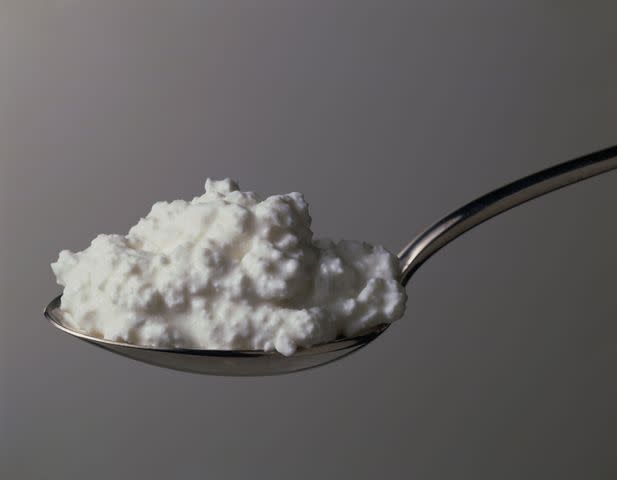What to Do About Loose Stools From IBS
Medically reviewed by Priyanka Chugh, MD
Loose stools are a common symptom of irritable bowel syndrome (IBS), particularly diarrhea-predominant IBS (IBS-D). Dietary changes, stress management, and fiber supplements help some people with IBS manage loose stools.
These long-term approaches won't be of much help if you're in a pinch and need to harden your stool fast. In this case, you may want to relieve IBS-related loose stools by taking a stool hardener.
This article explains the cause of diarrhea in people with IBS, as well as how to firm up loose stools with diet, supplements, stress reduction, and more.

Ol'ga Efimova / EyeEm / Getty Images
When to Seek Medical Care
If you have loose stools lasting longer than two weeks, you need to seek medical care—especially if you have other symptoms like fever, blood or pus in your stool, and/or severe abdominal pain. It is important to figure out the cause and get treatment to avoid health complications of diarrhea like dehydration.
Learn About How Digestion Works
IBS symptoms stem from trouble with your digestive system. Understanding the different steps in the digestion process can help clarify why diarrhea can be a symptom of IBS.
The food you eat is broken down in your mouth and stomach first. Next, it moves to your small intestine where nutrients get absorbed. The small intestine sends any undigested fiber and water to your large intestine where the water is drawn out to form the stool. What’s left is what makes up a bowel movement.
For reasons that are not yet clear, people with IBS seem to have a change in the speed and appearance of their bowel movements. Loose stools in IBS can have a number of causes, such as:
Bowel movements that are too fast
Intestines make (secreting) too much liquid
Food components draw too much water into the stool
If you have diarrhea from IBS, here are a few tips for managing your symptoms.
Avoid Triggering Foods

Smneedham / Getty Images
These foods have a reputation for softening stool and can make diarrhea more likely (even in people who don’t have IBS):
Sugar-free foods, candies, and chewing gums that have artificial sweeteners that end in "-ol" in the ingredients list, including erythritol, xylitol, sorbitol, and maltitol
Caffeine-containing drinks like coffee, soda, and tea
Fortunately, none of these foods are essential for your health and you can cut them out of your diet without missing out on any key nutrients.
Eat an "Easy" Diet (But Only Temporarily)
Eating easy-to-digest foods while you have diarrhea can help give your digestion a break.
You may have grown up hearing about the “BRAT diet” for diarrhea, which refers to eating bananas, rice, applesauce, and toast when you have loose stools. This diet may help harden stools temporarily, but it's not meant to be a long-term solution because it lacks vital nutrients.
Getting enough liquid and electrolytes is important if you're experiencing diarrhea. Sodium can be found in broth, while potassium can be found in bananas, nectars, and boiled or mashed potatoes. Sports drinks and electrolyte solutions contain both sodium and potassium, but they can also have artificial sweeteners.
If you have mixed-type IBS (diarrhea alternating with constipation), a lot of the foods included in a bland diet (e.g., white bread, white rice) might be ones you'd want to avoid when you're constipated.
Watch Your Fruit Intake
Fruits are a good source of nutrients like vitamins, minerals, and antioxidants, but they also contain a type of natural sugar called fructose that can be hard on the gut.
The body has a limited ability to absorb large amounts of fructose. Eating a lot of fruit at once can contribute to loose stools because excess fructose makes its way into the large intestine, where it may absorb too much water.
Eating too much of any fruit can cause symptoms, but some fruits have a higher fructose content than others. You may want to avoid these high-fructose foods (or at least limit how much you eat) if you have IBS:
Apples
Dried fruit (e.g., raisins, dates, figs, prunes)
Grapes
Bananas (ripe)
Kiwi
Cherries
Lychee
Jackfruit
Mango
Pears
Papaya
Watermelon
Fruit juices (e.g., apple, grape, cranberry cocktail)
Fructose can also be found in non-fruit foods and drinks, especially sweeteners like high fructose corn syrup. It can be in anything from cereal, bread, crackers, and granola bars to condiments like pasta sauce and ketchup, honey, and agave. Soda, sweet tea, and some wines can also have a high fructose content.
For some people, following a diet that's low in fructose may improve their IBS symptoms. Examples of lower fructose fruits include:
Apricots
Avocado
Bananas (firm)
Berries (e.g., blueberries, raspberries, blackberries, strawberries)
Melon (e.g. honeydew, cantaloupe)
Oranges, lemons, limes
Nectarines
Clementines
Cranberries
Tangerines
Grapefruit
Pineapple
Peach
Passionfruit
Learn More: What Is Fructose Intolerance?
Be Mindful About Magnesium
Magnesium is an important nutrient that your body needs but it can act as a laxative. In fact, it is a main ingredient in most preps for colonoscopies.
Check any over-the-counter (OTC) products you take regularly to see if they have magnesium in them. Examples of common products that have magnesium as an ingredient include:
Antacids used to relieve heartburn and indigestion
Multivitamins
Other vitamin formulations
Learn More: Should You Take a Magnesium Supplement?
Eat Probiotic-Rich Foods
Probiotics are types of bacteria thought to be beneficial for health, especially digestion. Studies have shown that probiotics may promote a healthy balance of gut bacteria. Researchers think it's possible that the effect of the bacteria in the intestines may help some people with IBS symptoms.
Having the right balance of gut bacteria can reduce gas and help food move better through your digestive tract. Both of these effects can slow the speed of intestinal contractions that ?contribute to loose stools.
You can increase your intake of probiotics naturally by adding these foods to your diet:
High-fiber foods
Fruits and vegetables
Fermented foods (e.g., yogurt, sauerkraut, tempeh, kimchi, miso, and kombucha)
What About Probiotic Supplements?
Probiotic supplements are not recommended by the American Gastroenterology Association (AGA) because there is not enough research evidence that they are helpful for conditions like IBS.
If you want to try taking an OTC probiotic supplement, ask your provider for recommendations. However, keep in mind that supplements can be expensive, so find one that you can consistently afford.
Add a Fiber Supplement
Fiber supplements or bulk laxatives are usually recommended for constipation, but they can also help with IBS-related loose stools.
Soluble fiber supplements like psyllium and calcium polycarbophil absorb water, which helps slow digestion. Insoluble fiber adds bulk to your stools.
Here are some options you can find at the pharmacy or grocery store:?
Fiberall, Genfiber, Konsyl, Metamucil (psyllium)
Fibercon, Equalactin (calcium polycarbophil)
Citrucel (methylcellulose)
Learn More: How to Get More Fiber
Manage Stress
The body's natural stress response can speed up intestinal movement. If you can reduce your stress, your body might be able to hold onto stool longer. If it has a little more time in your GI tract, stool can firm up as the water is drawn out.
Whenever possible, try to reduce the amount of stress in your life. When unavaoidable, you might find it helpful to engage in stress-reducing activities like:
Meditation
Relaxation exercises
Tai chi
Yoga
If you're having a hard time managing stress and feel overwhelmed, tell your provider. It might be helpful to talk with a mental health professional.
Learn More: IBS and the Stress Response
Try an Antidiarrheal
Antidiarrheal medications work to slow the passage of substances through the intestines. Slowing intestinal transit gives the body more time to absorb water, making stools harder. For people with IBS and diarrhea, antidiarrheals can reduce the number of bowel movements and improve stool consistency.
Examples of OTC medications used for loose stools in IBS and other conditions include:
OTC stool hardeners are safe if taken in the recommended dosage. However, a word of caution is advised. Taking more Imodium than what the label says can lead to serious heart problems in some people. People who are pregnant should not take Pepto-Bismol.
If OTC antidiarrheals don't work, your next option may be a prescription medication.
Learn More: Which Antibiotics Cause Diarrhea?
Ask Your Provider About Medications
If addressing common triggers for loose stools and remedies to harden your stool haven’t helped, consider prescription treatments for diarrhea such as:
Lomotil
Alosetron
Hyoscyamine
Viberzi
Rifaximin
Clonidine
Other treatments for diarrhea include:
Antimicrobial medications
Learn More: Medications for IBS-D
When to Get Medical Care for Loose Stools
Loose stools can have many causes. Diarrhea can be a symptom of acute, short-lived illnesses or long-term, chronic illnesses.
If you are having loose stools and any of the following concerning symptoms, you need to see a provider right away:
Blood or pus in the stool
Dehydration
Fever that is higher than 102 or lasts longer than three days
Severe abdominal pain
Stool that is black or tarry
Unexplained weight loss
If you have IBS and have had diarrhea for more than two weeks, it's important to tell your provider. You may need a different strategy to manage loose stools from IBS, or it may not be IBS that's causing your symptoms.
Summary
Loose stools are a common IBS symptom. Some people with IBS find that cutting out caffeine, being mindful of fruit intake, avoiding OTC products that contain magnesium, eating probiotic-rich foods, trying out fiber supplements, or taking a stool hardener can help with loose stools.
It’s important to talk to your provider if you are having IBS-related diarrhea often and nothing you've tried has helped. If you don’t have a diagnosis but think your symptoms could be IBS, your provider can help determine if it (or something else) is the cause of your loose stools.
Read the original article on Verywell Health.
